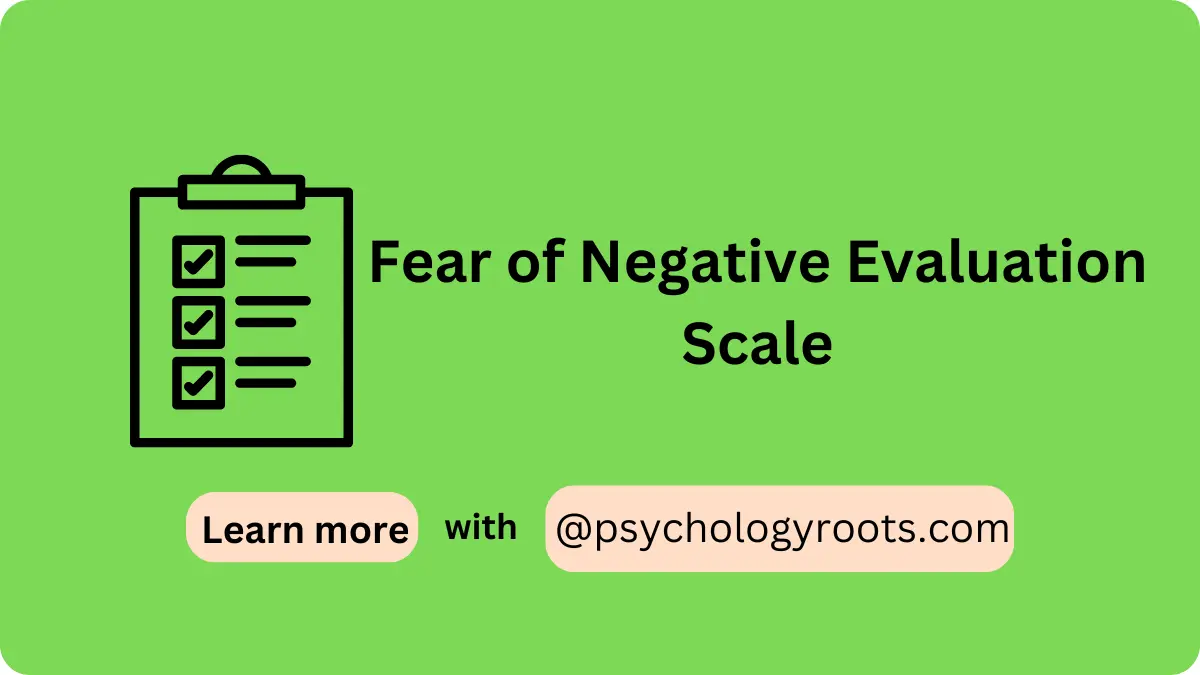Table of Contents
Fear of Negative Evaluation Scale
Here in this post, we are sharing the “Fear of Negative Evaluation Scale”. You can read psychometric and Author information. We have thousands of Scales and questionnaires in our collection (See Scales and Questionnaires). You can demand us any scale and questionnaires related to psychology through our community, and we will provide you with a short time. Keep visiting Psychology Roots.
About Fear of Negative Evaluation Scale
Scale Name
Fear of Negative Evaluation Scale
Author Details
Watson, D., & Friend, R. (1969)
Translation Availability
Not Sure

Background/Description
The Fear of Negative Evaluation Scale (FNE) is a psychological assessment tool developed by Watson and Friend (1969) to measure an individual’s anxiety about being negatively evaluated by others. The scale assesses social-evaluative anxiety, which is a core component of social anxiety disorder and other conditions related to self-consciousness in social settings. People with high scores on the FNE tend to be overly concerned about receiving criticism or disapproval and may avoid social situations due to this fear.
The scale has been widely used in research to explore social anxiety, self-esteem, and interpersonal relations. It remains one of the most popular tools for evaluating social anxiety, especially in contexts where individuals fear rejection, ridicule, or judgment.
Administration, Scoring and Interpretation
- Format: The FNE Scale consists of 30 true/false statements. Respondents indicate whether they agree or disagree with each statement based on their personal experiences.
- Scoring: Each true response indicates a higher fear of negative evaluation. The total score is calculated by summing the number of true responses, with higher scores reflecting a higher level of social anxiety or fear of disapproval.
Reliability and Validity
The FNE Scale has shown strong reliability and validity across numerous studies. Its internal consistency is high, with Cronbach’s alpha values typically ranging between 0.90 and 0.94. Additionally, the scale has been validated through its correlations with other measures of social anxiety and self-esteem, showing that it accurately assesses the construct of fear of negative evaluation.
Available Versions
30-Items
Reference
Watson, D., & Friend, R. (1969). Measurement of social-evaluative anxiety. Journal of consulting and clinical psychology, 33(4), 448.
Important Link
Scale File:
Frequently Asked Questions
What is the Fear of Negative Evaluation Scale (FNE)?
The FNE is a tool used to assess the anxiety or fear of being negatively judged or evaluated by others.
What types of statements are included in the FNE Scale?
The FNE consists of true/false statements that explore an individual’s concern about social disapproval, criticism, or rejection.
Who is this scale for?
It is often used in clinical and research settings to measure social anxiety and fear of judgment, particularly in individuals with social anxiety disorder.
Is the FNE Scale reliable?
Yes, the FNE Scale has demonstrated high reliability and validity, making it a trusted tool for assessing fear of negative evaluation in psychological assessments.
Disclaimer
Please note that Psychology Roots does not have the right to grant permission for the use of any psychological scales or assessments listed on its website. To use any scale or assessment, you must obtain permission directly from the author or translator of the tool. Psychology Roots provides information about various tools and their administration procedures, but it is your responsibility to obtain proper permissions before using any scale or assessment. If you need further information about an author’s contact details, please submit a query to the Psychology Roots team.
Help Us Improve This Article
Have you discovered an inaccuracy? We put out great effort to give accurate and scientifically trustworthy information to our readers. Please notify us if you discover any typographical or grammatical errors.
Make a comment. We acknowledge and appreciate your efforts.
Share With Us
If you have any scale or any material related to psychology kindly share it with us at psychologyroots@gmail.com. We help others on behalf of you.